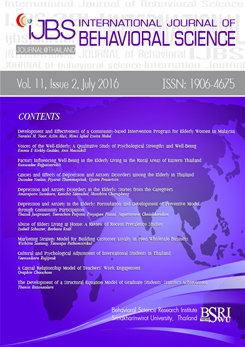The Development of a Structural Equation Model of Graduate Students’ Statistics Achievement
Main Article Content
Abstract
The aim of this research was to test the hypothesized model of the effects of attitudes towards statistics, statistics anxiety and teaching quality on graduate students’ statistics achievement. The samples were 246 Master’s degree students who registered in the course of statistics for research that the researcher taught in two universities, one public university and one private university in Thailand. Multi-stage random sampling was used and data was collected through a test, a survey of the attitudes towards statistics (SATS), statistical anxiety rating scale (STARS) and a course experience questionnaire (CEQ). The structural model (SEM) was used in data analysis. The results showed that the structural equation model of graduate students’ statistics achievement had a good fit with the empirical data. The statistical values were Chi-square (c2)=187.87, df=176, c2/df =1.07, p-value=0.26, RMSEA=0.02, RMR=0.02, GFI=0.93, AGFI=0.91 and CFI=0.99. From the validated model, the attitudes towards statistics and teaching quality had a significantly positive direct effect on statistics achievement. Besides this, the statistics anxiety had a significantly negative direct effect on statistics achievement. Furthermore, teaching quality had an indirect effect on statistics achievement, which was mediated by attitudes towards statistics and statistics anxiety. The attitudes towards statistics, statistics anxiety, and teaching quality accounted for the 53% variances in the graduate students’ statistics achievement. As a result, these findings could be used for teaching and learning management in the subject of statistics at the graduate level.
Keywords: structural equation modeling, statistics achievement, attitudes towards statistics, statistics anxiety, teaching quality, graduate students


